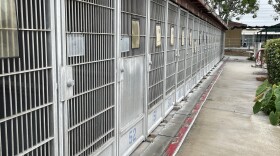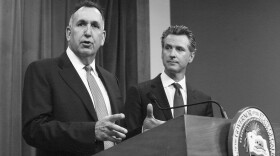RENEE MONTAGNE, host:
When President Bush meets Chinese President Hu Jintao this week in Sydney, one thing they'll be talking about is the safety of Chinese products. The world's largest toy maker, Mattel, announced yet another recall yesterday. It's the third recall of Chinese-made toys so far this summer.
NPR's Louisa Lim has this look at how China is responding to the growing worries about the safety of the made in China brand.
(Soundbite of Chinese TV program)
Unidentified Man #1: (Chinese spoken)
LOUISA LIM: China has declared war on unsafe products, with a full-month long crackdown targeting dodgy producers. One of the weapons in its propaganda arsenal, this series of programs on Chinese television, praising the made in China brands. Tom Doctoroff, the China chief executive of advertising agency JWT, says Beijing now realizes the issue of product safety could spiral out of control.
Mr. TOM DOCTOROFF (CEO, JWT): There has been a sea change in the realization that this is a fundamental issue. I haven't seen such mobilization of message since the SARS episode several years ago. You can see that the message has been extremely carefully crafted from the center and being micromanaged.
Unidentified Man #2: I'm a good consumer in China. I add a lot to the local economy.
LIM: Staff from foreign chambers of commerce enthusiastically endorse Chinese products on air. The focus of the propaganda effort seems to be directed domestically, while much of the criticism is coming from China's export markets. Sung Kwo Yeo(ph), a researcher at the Fudan University, says this underlines Beijing's shortcoming at playing the PR game.
Mr. SUNG KWO YEO (Researcher, Fudan University, China): (Trough translator) The Chinese government needs to do more. It's an external crisis, not a domestic one. I believe Beijing wants to publicize the real situation to the foreign media, but it does know how to deal with the foreign media.
LIM: To protect those export markets has been a flurry of new initiatives. A new panel headed by influential Vice Premier Wu Yi, a new recall system for substandard goods, and a new quality guarantee labels for exported foodstuff. But these developments are balanced against another prong in the strategy - a packing substandard American products and politicizing the issue.
A senior Chinese official, Li Xanjang(ph), cultures the issue as the first shots in a trade war.
Mr. LI XANJANG (Government Official, Beijing): (Through translator) I think that talking about the threat from Chinese products or demonizing Chinese products is a new form of trade protectionism. I'm just telling you to believe in Made in China.
LIM: That plea on national television could underlie a serious attempt to shore up confidence at home. After all, China's double-digit economic growth has been export-led, and Beijing needs to show it can protect its people and safeguard their income.
China's long taken pride in its reputation as the workshop of the world, and it's hoping to move up the value chain into more high-tech products. With this crisis of confidence, that aim may be delayed, but in the long run, this predicament could be good for China, forcing it to up its game.
Louisa Lim, NPR News, Shanghai. Transcript provided by NPR, Copyright NPR.






